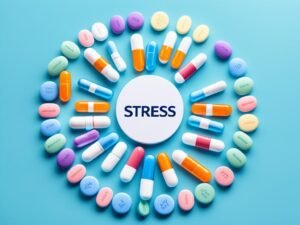Anxiety is a major issue that many people face. It affects over 19% of adults in the United States every year. People with anxiety may feel nervous, worried, or have a racing heart. They might even feel chest pain.
There are natural ways to help with these feelings. Things like exercise, meditation, and even spending time with animals can make a difference. But, if these feelings don’t go away, or if they stop you from living your life, you might need more help.
This is where seeing a doctor or therapist can be important. They might suggest things like talking therapy or medications. It’s all about finding the best mix of treatments for you. This way, you can feel better and enjoy life more.
Key Takeaways
- Anxiety affects over 19% of US adults annually
- Natural remedies like exercise and meditation can help manage anxiety symptoms
- Prescription medications may be needed for chronic or severe anxiety
- Working with a healthcare provider is crucial for finding the right treatment approach
- Combining various evidence-based therapies can provide the most effective anxiety relief
Understanding Anxiety and Stress
Anxiety disorders bring about a lot of symptoms of anxiety disorders. These can really mess with your day-to-day life. They often include being too worried, feeling on edge, trouble concentrating, feeling tired, and problems sleeping. It’s key to know the causes of chronic stress and anxiety to deal with these issues well.
Symptoms of Anxiety Disorders
Anxiety can show up in many ways, both in your body and mind. You might feel really nervous, worried, or uneasy a lot. It’s tough to keep these feelings under control. You could also get easily irritated, have a hard time focusing, and feel tense in your muscles. All this can really shake up what you do every day.
Causes of Chronic Stress and Anxiety
Chronic stress and anxiety may have lots of causes. They could be from your genes, past events, health issues, or drug use. Big changes or hard times might also be reasons. Spotting and dealing with these stress and anxiety causes can help a lot. Things such as how you handle stress, your brain’s job chemistry, and past ways of dealing with things can play a part in ongoing anxiety.
Natural Remedies for Anxiety Relief
There are many natural ways to help with anxiety. They can work well with medicine or therapy. This gives an extra way to feel better.
Exercise and Physical Activity
Moving your body helps a lot with anxiety. It makes the body’s feel-good hormones. This makes you feel less worried. Even just walking, swimming, or doing yoga helps a lot.
Meditation and Mindfulness Practices
Being aware of the moment, by meditating or being mindful, is great for anxiety. It helps reduce stress. Breathing deeply and checking your body can relax your mind and body.
Relaxation Techniques
Other ways to relax can also help with anxiety. Trying muscle relaxation, yoga, or imagining calm scenes can really calm you down. This makes your body and mind feel peaceful.
Trying these natural ways can really help with anxiety. But, speak with your doctor first. Some may not mix well with your medicines or have other issues.
Herbal Supplements for Stress Management
Many people use herbal supplements to ease stress and anxiety. Certain herbs can help. But, you should talk to a doctor first, especially if you take other medicines. This is because some herbs might not mix well with drugs you’re already on.
Chamomile Tea
Chamomile tea is well-known for stress relief. It can lower your main stress hormone, cortisol. This makes you feel less worried. Just be careful with it if you’re on blood thinners, as it might increase the risk of bleeding.
Valerian Root
Valerian root is a top choice for natural stress management. Some studies say it can reduce anxiety. However, not all research agrees. It’s usually safe, but it might make you sleepy or cause stomach issues.
Lavender Essential Oil
Lavender oil is famous for calming anxiety too. It can help you relax if you breathe it in or take it by mouth. But, it’s not confirmed it truly helps with stress relief. Also, it might cause stomach problems.
Remember, the FDA doesn’t check herbal supplements like they do with drugs. This means the quality can vary. Always buy from trusted sources and talk to your doctor before adding herbal supplements for anxiety to your health plan.
Meds for Stress: Prescription Options
If you’re really struggling with anxiety, natural ways might not be enough. Your doctor could give you prescription medications for anxiety. These include benzodiazepines, antidepressants, and sleeping aids. Each has its own good and bad points.
Benzodiazepines (Xanax, Valium)
Doctors often use benzodiazepines for anxiety, like Xanax and Valium, for quick relief. They help calm your mind and body fast. But, using them for a long time can lead to them being needed, which is not so good. Normally, you only take these for a short period, like up to a year, for panic attacks.
Antidepressants (SSRIs)
Another type of prescription medications for anxiety are SSRIs. These include Prozac and Zoloft. They raise serotonin in the brain, easing anxiety. You take them for a long time, but they take a few weeks to show their full effect.
Sleeping Medications
For those whose anxiety is keeping them awake, doctors might prescribe sleeping pills for anxiety. These could be drugs like Ambien or Lunesta. It’s key to follow exactly what your doctor says when using these meds.
It’s very important to talk openly with your doctor about your anxiety. Tell them about your health history and any worries. This helps in finding the best mix of treatments for you.
Complementary and Alternative Therapies
Complementary and alternative therapies help with anxiety. Aromatherapy uses oils like lavender and chamomile to help relax. Cannabidiol (CBD) oil without THC might ease anxiety. Animal-assisted therapy with trained animals also lowers anxiety. These methods work well with other treatments.
Aromatherapy
Aromatherapy uses oils for their healing qualities. Oils from lavender and bergamot can calm you down. They help reduce anxiety and stress.
Cannabidiol (CBD) Oil
CBD oil is from the hemp plant and doesn’t make you high. It helps relax you, some studies shows. It might ease anxiety without making you feel strange.
Animal-Assisted Therapy
Animal-assisted therapy is meeting therapy animals like dogs or cats. It makes you feel calm and less worried. Spending time with these animals can relax you.
Lifestyle Changes for Stress Reduction
Changing your life a bit can lower anxiety and stress. Use time management strategies like setting tasks first and splitting big projects. This helps not to feel so overwhelmed. Also, writing things down in a journal or diary can make your heart feel lighter. These steps, along with other ways to handle stress, can really help.
Time Management Strategies
Good time management is key to less stress. Set tasks based on what’s most important. Break big jobs into smaller parts, and give each part its own time. This makes things feel more doable. Then, you don’t feel as stressed, and there’s more peace.
Journaling and Expressive Writing
Writing in a journal can be a strong way to handle anxiety. When you write down your thoughts and feelings, it helps you understand yourself better. And it can show you how to deal with tough emotions. This simple act can make you feel better and help you face fears without as much worry.
Combining Natural and Conventional Treatments
Many people manage their anxiety by combining natural remedies with conventional medical treatments. This integrative approach lets them use the best from both worlds. Yet, it’s vital to talk to a doctor. Some natural things you take might not be OK with your medicine. The right mix of treatments changes from person to person.
When you mix combining natural remedies with conventional medical treatments for anxiety, talk to your doctor. They can help you figure out the best mix for you. This might mean adding things like meditation, exercise, or herbs to your regular medicine.
Using both combining natural remedies with conventional medical treatments is a great way to deal with anxiety. When you combine these ways, they work together better than when used by themselves. This can make you feel better than just one way alone.
When to Seek Professional Help
For mild to moderate anxiety, natural remedies often help. But, when it gets severe, professional help is needed. If your anxiety lasts more than 6 months and stops you from daily tasks, it may be serious. Also, if it causes strong physical signs like fast heart rate or trouble sleeping, medical help is necessary. Thinking about hurting yourself or suicide means you should talk to a mental health provider right away.
Signs of Severe Anxiety Disorder
There are some clear signs of severe anxiety that need professional help. They include:
- Persistent, uncontrollable worry or fear that stops you from doing everyday things
- Physical symptoms like chest pain, rapid heartbeat, shortness of breath, or muscle tension that last long
- Difficulty sleeping or concentrating because of too much anxiety
- Avoidance of social situations or activities that make you anxious
- Big problems in work, school, or relationships because of anxiety
- Thoughts of hurting yourself or ending your life
If you notice these severe anxiety signs, getting help is key. A therapist or doctor can check your condition and offer the right anxiety treatments. They will also teach you how to deal with it.
The Role of Therapy in Anxiety Management
Many people find therapy very helpful for dealing with anxiety. Cognitive behavioral therapy (CBT) stands out as a top choice. It teaches skills to swap out bad thoughts that cause anxiety. Therapy, along with other treatments, can help beat anxiety for a long time.
Cognitive Behavioral Therapy (CBT)
CBT is well-organized and usually lasts for a few months. At weekly sessions, patients learn to change harmful thoughts and actions. This method includes exposure therapy. It slowly exposes people to their fears so they can conquer them.
CBT works well for different types of anxiety, like Generalized or Social Anxiety Disorder. It lessens symptoms and boosts daily performance. By showing coping strategies, CBT helps a lot in managing anxiety.
Meds for Stress: Precautions and Safety Considerations
Prescription drugs can help with anxiety, but it’s wise to know the precautions and safety considerations. Many anti-anxiety pills, like benzodiazepines, and sleep aids have dependence and withdrawal risks. Antidepressants may cause drowsiness, upset stomach, and trouble with sex. Even some herbal supplements can interfere with prescription anxiety medicines. Always listen to what your doctor says and tell them about any bad effects you feel.
| Medication Type | Potential Precautions and Side Effects |
|---|---|
| Benzodiazepines (e.g., Xanax, Valium) | Risk of dependence and withdrawal; sedation |
| Antidepressants (SSRIs) | Nausea, headache, sexual dysfunction; increased suicidal thoughts in young adults |
| Sleeping Medications | Dependence and withdrawal; daytime drowsiness |
| Antipsychotics | Increased risk of stroke and death in older adults; tardive dyskinesia |
| Herbal Supplements | Potential interactions with prescription medications |
It’s really important to team up with your doctor when using prescription drugs for anxiety. They know how to handle potential side effects and interactions. This keeps you safe and helps figure out the best treatment for you.
Finding the Right Approach for You
Dealing with anxiety needs a special plan just for you. The best anxiety management approach changes from person to person. It depends on what causes your anxiety and what you like. Some find help with natural remedies alone. But, some may need a mix of therapies and medications for the best anxiety relief.
Talking with a doctor is key. This helps you evaluate the options and make a good treatment plan that fits you. Your plan should be all about what you need. It might include different anxiety relief strategies. And it should be okay to make changes to get the most effective approach for managing your anxiety.
Finding what works for you can really help you feel better. Choosing the best anxiety management approach will make your life better. It’s up to you to see what fits. Don’t worry about trying different things until you find what helps you best.
Conclusion
Managing stress and anxiety needs a lot of ways. Things like exercise and meditation can help. For bigger anxiety issues, you might need pills or therapy. It’s good to mix different treatments to lessen your anxiety.
Make a plan using the best meds and treatments. You can try natural or prescription ways. The aim is to get better and feel less anxious.
Each person fights anxiety in their own way. Keep trying until you find what helps you most. With support and a good plan, you can control your anxiety. This will bring more calm and joy into your life.




